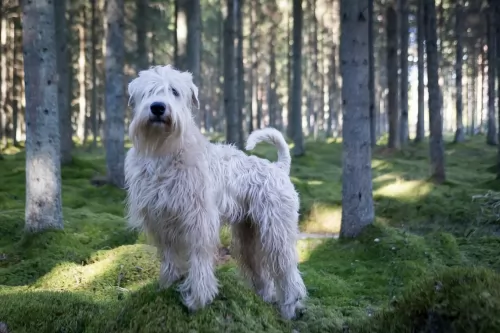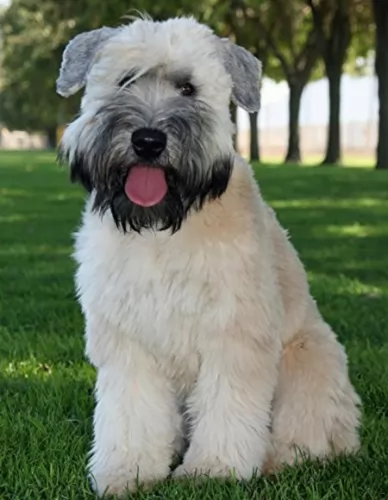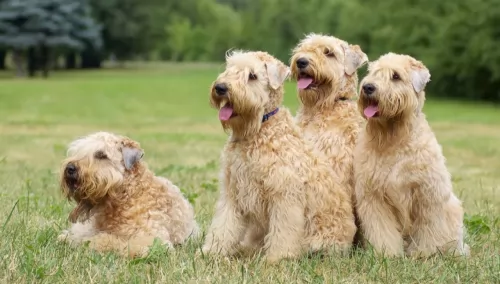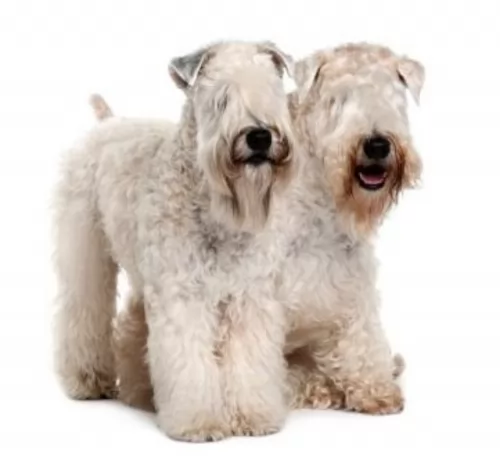 Petzlover
Petzlover Dogue De Bordeaux is originated from France but Soft-Coated Wheaten Terrier is originated from United Kingdom. Dogue De Bordeaux may grow 17 cm / 7 inches higher than Soft-Coated Wheaten Terrier. Dogue De Bordeaux may weigh 45 kg / 100 pounds more than Soft-Coated Wheaten Terrier. Dogue De Bordeaux may live 5 years less than Soft-Coated Wheaten Terrier. Both Dogue De Bordeaux and Soft-Coated Wheaten Terrier has same litter size. Dogue De Bordeaux requires Low Maintenance. But Soft-Coated Wheaten Terrier requires Moderate Maintenance
Dogue De Bordeaux is originated from France but Soft-Coated Wheaten Terrier is originated from United Kingdom. Dogue De Bordeaux may grow 17 cm / 7 inches higher than Soft-Coated Wheaten Terrier. Dogue De Bordeaux may weigh 45 kg / 100 pounds more than Soft-Coated Wheaten Terrier. Dogue De Bordeaux may live 5 years less than Soft-Coated Wheaten Terrier. Both Dogue De Bordeaux and Soft-Coated Wheaten Terrier has same litter size. Dogue De Bordeaux requires Low Maintenance. But Soft-Coated Wheaten Terrier requires Moderate Maintenance
 The Dogue de Bordeaux is an ancient French dog breed and his history goes so far back that it is difficult to have accurate records of his origin.
The Dogue de Bordeaux is an ancient French dog breed and his history goes so far back that it is difficult to have accurate records of his origin.
During the 1700s he was used as a guard dog, with theories suggesting that several Mastiff type breeds were the closest ancestors.
For centuries the Bordeaux Mastiff, also referred to as the Bordeaux Bulldog, came in two size varieties, with the larger version being the Dogue de Bordeaux. It is this large dog which made its appearance in the Hollywood movie ‘Turner & Hooch’, shooting him into more recognition and interest.
 This wheaten colored terrier hails from Ireland. Although the Wheaten has been around for a long time, it was in 1937 that he was recognized as a breed in Ireland.
This wheaten colored terrier hails from Ireland. Although the Wheaten has been around for a long time, it was in 1937 that he was recognized as a breed in Ireland.
The British Kennel Club also recognized the Wheaten and the dog was also exported to the United States. Serious interest started being shown for the Terrier in the 1970s. It was in 1973 that they were recognised by the American Kennel Club.
 The Dogue de Bordeaux is a large molosser type dog with a large head, standing at 60 – 67cm and weighing anything between 54 and 65kg. His weight comes more from his muscular, powerful build rather than his height.
The Dogue de Bordeaux is a large molosser type dog with a large head, standing at 60 – 67cm and weighing anything between 54 and 65kg. His weight comes more from his muscular, powerful build rather than his height.
He is a powerful looking dog and his short coat is loose-fitting and is an attractive rich reddish brown color. There are wrinkles around the face with the nose being somewhat pinkish-orange as opposed to black.
The eyes are wide apart and are hazel. He has short to medium length floppy ears and where once the thick tail was docked, giving him a powerful, distinctive look, it is mostly left long today.
He is a confident, self-assured, territorial dog who will require training and socialization if he is to know his place in the home. He is a powerful mastiff-type dog, who without training can be stubborn, arrogant and somewhat aggressive towards strangers.
His looks and his territorial nature make him an excellent watchdog. He is no push-over and isn’t a good choice for the first time dog owner.
Without a strong, firm owner, he could prove difficult to handle. He is calm and laid back with children in the home and he can get along well with other pets if he has been brought up with them since puppy-hood.
 The Wheaten is a medium sized dog standing at between 43 and 50cm and weighing between 13 and 20kg both male and female. The coat of the dog is soft, silky and wavy to even curly and is a wheaten to ginger color.
The Wheaten is a medium sized dog standing at between 43 and 50cm and weighing between 13 and 20kg both male and female. The coat of the dog is soft, silky and wavy to even curly and is a wheaten to ginger color.
The coat of the puppy is dark but as he grows up it changes into the wheaten color although the ears may be a dark brown color. Pet owners like that the Wheaten is a very low shedding dog.
Playful, social and friendly, the Wheaten has always been put to good use on the farm. These days he is pet and companion. He is energetic and playful so children love having him around.
He is slightly more hyper and energetic than other Terrier breeds so will require a good dose of exercise.
He is smart and strong willed, and training and socialization turns him into an amicable pet to have around, so much so that he is sought after as a therapy-dog.
They’re easy-going dogs with no aggression issues but they still make great watch dogs and want to do whatever it takes to look after- and protect their human family.
 The Dogue de Bordeaux isn’t a big, boisterous kind of dog but is rather calm and relaxed. As a watchdog however, he can surprise you and become quite active, showing agility for such a hulk.
The Dogue de Bordeaux isn’t a big, boisterous kind of dog but is rather calm and relaxed. As a watchdog however, he can surprise you and become quite active, showing agility for such a hulk.
He can adapt to life in the city or the country but even though he appears lazy, he will need moderate daily exercise.
He loves his human family and wants to be constantly with them. He is stubborn but will do well with training and socialization.
Calm and easy-going and with his easy-to-maintain short, soft coat, be prepared for some drooling and snoring from this loving, devoted large pet of yours.
 The Soft Coated Wheaten Terrier has always made an excellent farm dog, but today he is more suited as pet and companion.
The Soft Coated Wheaten Terrier has always made an excellent farm dog, but today he is more suited as pet and companion.
He adapts easily to life in the city or the countryside. Wherever he is, he will need his exercise. He also longs to be an active part of his human family, and then he’s happy, lively, social and friendly and is a great playmate for children.
 The Dogue De Bordeaux doesn’t have as long a lifespan as many other dogs, but with good care, can go to 7 – 10 years of age.
The Dogue De Bordeaux doesn’t have as long a lifespan as many other dogs, but with good care, can go to 7 – 10 years of age.
Because he is a brachycephalic breed – a short-nosed dog such as the Boxer, Pug and Bulldog – he may well have the same number of teeth as other dogs, but the teeth are crowded, putting dogs like this at higher risk of getting dental disease.
His teeth will need to be brushed 2 or 3 times a week to prevent plaque and tartar getting trapped.
Brachycephalic Syndrome is also something to watch out for with your Dogue de Bordeaux. It’s an upper respiratory disorder which can bring on difficulty with breathing because of the crowding of tissue and narrower airways.
 When you bring a Wheaten Terrier into your home, you’re not likely to have too many vet fees as he tends to be a healthy dog breed, being able to reach 13, 14 or 15 years of age with good care.
When you bring a Wheaten Terrier into your home, you’re not likely to have too many vet fees as he tends to be a healthy dog breed, being able to reach 13, 14 or 15 years of age with good care.
Look out for a dog ailment known as Protein-losing enteropathy (PLE). This is a condition where the dog isn’t able to properly absorb protein in the digestive tract, so that it is passed in their stools.
It can be fatal, but if caught early, some dietary changes can keep it under control.
Also, look out for inflammatory bowel disease. This disease occurs when the stomach of the dog has a large number of inflammatory cells which can change the lining of the digestive tract, preventing the normal absorption of food.
 He isn’t the most active dog and he is inclined to snooze quite a bit throughout the day. It will nonetheless be a good idea to include him in your daily walks and allow him to take part in a ball game now and again.
He isn’t the most active dog and he is inclined to snooze quite a bit throughout the day. It will nonetheless be a good idea to include him in your daily walks and allow him to take part in a ball game now and again.
The Dogue de Bordeaux needs to be fed a high-quality dog food in keeping with his large size and age.
This dog is known for drooling, and because of his wrinkled face, you’ll need to be watching the facial area that it is kept clean and dry to avoid skin infections. Check his ears at the same time to ensure they are free from dirt and wax.
The short coat does shed throughout the year, and you will need to be brushing him down twice a week to remove all those loose hairs.
 Brush your pet’s silky coat twice a week. Such a silky coat can get all tangled and matted. If you prefer, many people opt to rather have the Wheaten’s coat professionally clipped as then it is easier to handle. They like to have the hair clipped that hangs over the dog’s eyes.
Brush your pet’s silky coat twice a week. Such a silky coat can get all tangled and matted. If you prefer, many people opt to rather have the Wheaten’s coat professionally clipped as then it is easier to handle. They like to have the hair clipped that hangs over the dog’s eyes.
Other grooming tasks require you to check inside his ears for redness which could indicate an infection. Trim his nails and check him over for ticks and fleas.
Have your Wheatie trained and socialized as he is a stubborn dog breed and you want him to be well mannered and obedient.
Terriers like this are energetic dogs and he is going to need exercise every day. A walk for a dog is always a welcome experience as it gives him the opportunity to sniff around and pick up new smells. Play ball- or frisbee games with him as this can tire him out a bit.
If your dog shows signs of illness, get him to the vet. He is such a feisty dog that it can be unbearable to see him out of sorts.
Terriers are energetic dogs so if you feed your dog one of the commercial dog foods, make sure the label indicates what food it is. This is because the foods are manufactured according to the type of dog it is, its age, size and energy levels.
Always try and go for the high quality foods which don’t have all those unhealthy ingredients in them. Try to include some home-made food – nothing exotic and spicy – just plain, wholesome food that won’t upset his stomach.
Boiled chicken, brown rice or pasta and spinach, sweet potatoes and carrots is super tasty and nutritious. You can chop it up and add it to your pet’s kibble twice a week.
Try and include a little bit of raw meat to his diet occasionally as this can go towards ensuring he doesn’t get skin diseases. Always ensure he has a constant supply of fresh, cool water available.